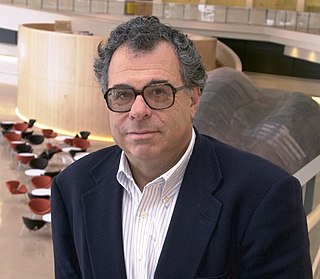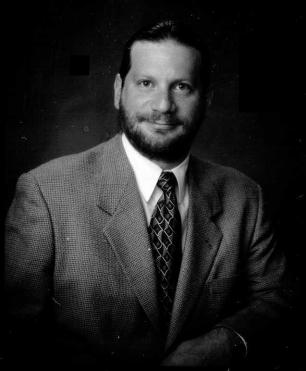Related Research Articles

David Baltimore is an American biologist, university administrator, and 1975 Nobel laureate in Physiology or Medicine. He is a professor of biology at the California Institute of Technology (Caltech), where he served as president from 1997 to 2006. He founded the Whitehead Institute and directed it from 1982 to 1990. In 2008, he served as president of the American Association for the Advancement of Science in 2008.

Howard Robert Horvitz ForMemRS NAS AAA&S APS NAM is an American biologist best known for his research on the nematode worm Caenorhabditis elegans, for which he was awarded the 2002 Nobel Prize in Physiology or Medicine, together with Sydney Brenner and John E. Sulston, whose "seminal discoveries concerning the genetic regulation of organ development and programmed cell death" were "important for medical research and have shed new light on the pathogenesis of many diseases".
Computational genomics refers to the use of computational and statistical analysis to decipher biology from genome sequences and related data, including both DNA and RNA sequence as well as other "post-genomic" data. These, in combination with computational and statistical approaches to understanding the function of the genes and statistical association analysis, this field is also often referred to as Computational and Statistical Genetics/genomics. As such, computational genomics may be regarded as a subset of bioinformatics and computational biology, but with a focus on using whole genomes to understand the principles of how the DNA of a species controls its biology at the molecular level and beyond. With the current abundance of massive biological datasets, computational studies have become one of the most important means to biological discovery.

David Botstein is an American biologist serving as the chief scientific officer of Calico. He served as the director of the Lewis-Sigler Institute for Integrative Genomics at Princeton University from 2003 to 2013, where he remains an Anthony B. Evnin Professor of Genomics.

David S. Eisenberg is an American biochemist and biophysicist best known for his contributions to structural biology and computational molecular biology, a professor at the University of California, Los Angeles since the early 1970s and director of the UCLA-DOE Institute for Genomics & Proteomics since the early 1990s, as well as a member of the California NanoSystems Institute (CNSI) at UCLA.

John Kuriyan is the dean of basic sciences and a professor of biochemistry at Vanderbilt University School of Medicine. He was formerly the Chancellor's Professor at the University of California, Berkeley in the departments of molecular and cell biology (MCB) and chemistry, a faculty scientist in Berkeley Lab's physical biosciences division, and a Howard Hughes Medical Institute investigator. He is a member of the National Academy of Sciences and he has also been on the Life Sciences jury for the Infosys Prize in 2009, 2019 and 2020.

David Haussler is an American bioinformatician known for his work leading the team that assembled the first human genome sequence in the race to complete the Human Genome Project and subsequently for comparative genome analysis that deepens understanding the molecular function and evolution of the genome.

Arthur L. Horwich is an American biologist and Sterling Professor of Genetics and Pediatrics at the Yale School of Medicine. Horwich has also been a Howard Hughes Medical Institute investigator since 1990. His research into protein folding uncovered the action of chaperonins, protein complexes that assist the folding of other proteins; Horwich first published this work in 1989.
Franz-Ulrich Hartl is a German biochemist and the current Executive Director of the Max Planck Institute of Biochemistry. He is known for his pioneering work in chaperone-mediated protein folding.

Harvey Franklin Lodish is a molecular and cell biologist, professor at the Massachusetts Institute of Technology (MIT), Founding Member of the Whitehead Institute for Biomedical Research, and lead author of the textbook Molecular Cell Biology. Lodish's research focused on cell surface proteins and other important areas at the interface between molecular cell biology and medicine.

Lawrence E. Hunter is a Professor and Director of the Center for Computational Pharmacology and of the Computational Bioscience Program at the University of Colorado School of Medicine and Professor of Computer Science at the University of Colorado Boulder. He is an internationally known scholar, focused on computational biology, knowledge-driven extraction of information from the primary biomedical literature, the semantic integration of knowledge resources in molecular biology, and the use of knowledge in the analysis of high-throughput data, as well as for his foundational work in computational biology, which led to the genesis of the major professional organization in the field and two international conferences.

Aviv Regev is a computational biologist and systems biologist and Executive Vice President and Head of Genentech Research and Early Development in Genentech/Roche. She is a core member at the Broad Institute of MIT and Harvard and professor at the Department of Biology of the Massachusetts Institute of Technology. Regev is a pioneer of single cell genomics and of computational and systems biology of gene regulatory circuits. She founded and leads the Human Cell Atlas project, together with Sarah Teichmann.
Zhijian "James" Chen is a Chinese-American biochemist and professor in the department of molecular biology at University of Texas Southwestern Medical Center. He is best known for his discovery of mechanisms by which nucleic acids trigger innate and autoimmune responses from the interior of a cell, work for which he received the 2019 Breakthrough Prize in Life Sciences.
Satyajit Mayor (born 1963) is an Indian biologist. He serves as director of the National Centre for Biological Sciences, Bangalore. Mayor is the former director of the Institute for Stem Cell Biology and Regenerative Medicine (inStem) at Bangalore, which has a focus on the study of stem cell and regenerative biology.
Alok Bhattacharya is an Indian parasitologist, academic and a professor at the School of Life Sciences of the Jawaharlal Nehru University. He chairs the Biotechnology Information System Network (BITSNET) as well as the Life Sciences Expert Committee of FIST program of the Department of Science and Technology (DST). He is an elected fellow of the Indian Academy of Sciences and the Indian National Science Academy and is known for his studies on Entamoeba histolytica and species-specific calcium binding protein and its gene.
Jeannie T. Lee is a Professor of Genetics at Harvard Medical School and the Massachusetts General Hospital, and a Howard Hughes Medical Institute Investigator. She is known for her work on X-chromosome inactivation and for discovering the functions of a new class of epigenetic regulators known as long noncoding RNAs (lncRNAs), including Xist and Tsix.

Mark S. Boguski was an American pathologist specializing in computational analysis and structural biology, He was elected in 2001 to the U.S. National Academy of Medicine, and was a Fellow of the American College of Medical Informatics.
Keith A. Crandall is an American computational biologist, bioinformaticist, and population geneticist, at George Washington University, where he is the founding director of the Computational Biology Institute, and professor in the Department of Biostatistics and Bioinformatics.
Katherine Snowden Pollard is the Director of the Gladstone Institute of Data Science and Biotechnology and a professor at the University of California, San Francisco (UCSF). She is a Chan Zuckerberg Biohub Investigator. She was awarded Fellowship of the International Society for Computational Biology in 2020 and the American Institute for Medical and Biological Engineering in 2021 for outstanding contributions to computational biology and bioinformatics.

M. Madan Babu is an Indian-American computational biologist and bioinformatician. He is the endowed chair in biological data science and director of the center of excellence for data-driven discovery at St. Jude Children’s Research Hospital. Previously, he served as a programme leader at the MRC Laboratory of Molecular Biology (LMB).
References
- ↑ http://mootha.med.harvard.edu/members_vm.html Mootha's biography
- ↑ https://www.broadinstitute.org/mitocarta/mitocarta30-inventory-mammalian-mitochondrial-proteins-and-pathways
- ↑ Mootha Laboratory
- ↑ Padma awards for 7 persons under NRI, PIO, foreign category - The Hindu
- ↑ "Five eminent personalities from the US get Padma awards, 3 of them Indian Americans". 27 January 2014.
- ↑ Vamsi Mootha | Broad Institute of MIT and Harvard
- ↑ Vamsi Mootha: Taking an inventory of mitochondria
- ↑ Lurie Prize in Biomedical Sciences 2023